So, how much does a goat cost? It seems like a simple enough of a question. But the answer has a few more layers than a simple dollar amount.
You have to take a few things into consideration when figuring up the cost of goats. First, there is the initial cost of purchasing the goat. But, then there are also the costs of getting the things you need for you goat as well as ongoing costs for the goats care.
Keep reading below for all the details on how much you can expect to pay from purchase through care for your goat.
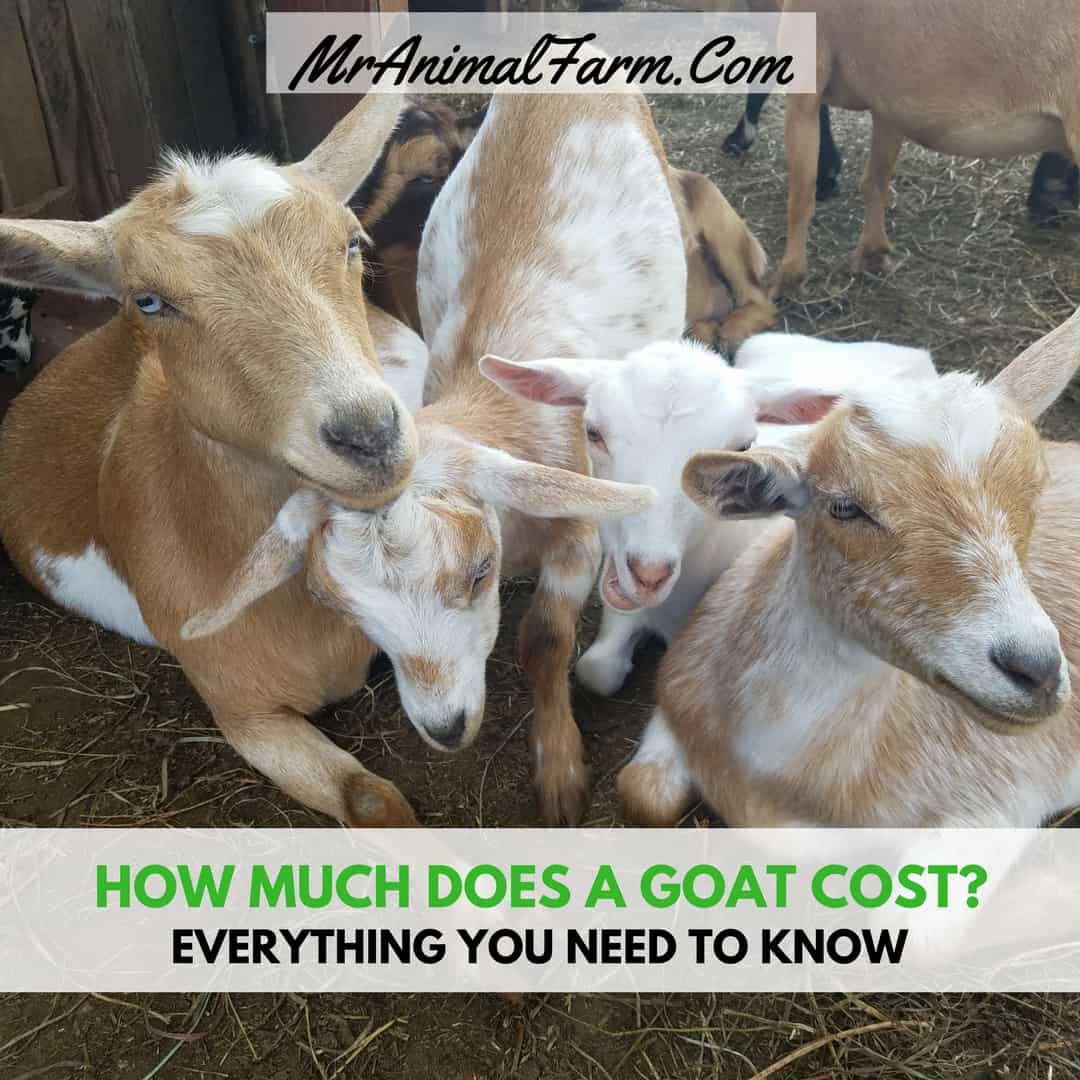
So, how much does a goat cost?
A goat can cost from free up to $3000 or more depending on breed, location and quality of the goat. Typically, you will pay about $50 to $150 for a wether, around $150 to $500 for bucks, and between $350 and $700 for does.
The price can still fluctuate considerably depending on the goat's purpose (milk, meat, fur), it's progeny, and whether or not it is registered. Many other things also factor into the cost of a goat, such as, shelter, feed, fencing, and general maintenance.
We will take a look below at how much you can expect to pay for each part of owning a goat.
Goat Care and Maintenance
How much is your goat going to cost for ongoing expenses after you factor in the initial goat purchase price?
Food
Your goats are going to need to eat. If you have plenty of browse and pasture land, that can help cut down on your total cost. But goats eat more than just grass. In fact, the list of what goats can eat is rathe long.
Your biggest and most reoccurring feed expense will probably be hay. A good quality hay will give your goats the nutrients they need, keep their rumen running properly, and provide them with warmth and insulation when it's cold (they will ALWAYS find a way to pull it down for bedding).
Prices will vary depending on your area but in our region of the US hay runs anywhere from $4/bale for straw and upwards of $8 or more/bale for high quality alfalfa hay. When we milk regularly we feed alfalfa hay. When we aren't milking we like to feed a mid range orchard grass/alfalfa mix.
Our average hay delivery is around $350 - $400 for 50-55 bales and will last about 6 weeks for 20 goats.
Supplemental feed
It is entirely possible to just feed hay and pasture and have a perfectly happy and healthy herd. But if you don't have good land for grazing or can't find a decent hay supplier, you may need to supplement their feed to make sure they are getting all of the nutrients their bodies require.
Usually, this will come in the form of a pellet feed, compressed alfalfa, or a sweet grain. When we have a goat that needs to put on a little extra weight, we tend to give them a mix of alfalfa pellets and black oil sunflower seeds.
The price of these bags will vary but you can expect to spend somewhere in the $12 to $15 range for a 50 pound bag of feed.
Fencing and Shelter
Goats hate, hate, HATE! getting wet. If it's raining and they don't have anywhere to go, they will be miserable. So they are going to need a shelter with a reliable roof and enough walls to give them a wind break. basically, they just need somewhere to stay warm and dry.
You can always go the make your own goat pen and make your own shelter. You can also repurpose old tool sheds (or buy a new one).
Fencing is incredibly important with goats. They are energetic, fun, and most of all, curious creatures. They love, love, LOVE! to explore. If you have a weakness in your fence, they WILL find it and they WILL bounce around freely through your neighbors backyard...even if that neighbor is a few acres away (trust me).
You will need to factor in the cost of building a goat fence or making an area that is secure for your herd. We have gone down this road and can also help offer some goat fencing tips and tricks to cut those costs down.
Goat Health and Wellness
I've heard many farmers say that goats are in a race to die. While we think that is a bit dramatic, we can't deny that goats seem to have a penchant for getting sick or injured (maybe it has to do with their aforementioned curiosity).
Whatever the reason may be, your goats are going to need medical care. You can always be prepared and make sure you have the essential goat medical supplies on hand.
But you will also need a good livestock vet. Unfortunately you can't just take your goats to a regular vet like for your dog or cat (no, not even dwarf goats). We are lucky in that we found a vet that also runs a regular vet. So their prices for a checkup are about the same as a household pet.
Need some help to keep your goats healthy and maintained? The G.O.A.T Herd Management Binder has you covered from supplies to routine care reminders.
How Much Does a Goat Cost for the initial purchase?
The intial purchase price for goats will vary depending on breed, sex, quality and registration status. But here are some averages that we have seen for registered goats within and around our region (the Mid-Atlantic area of the US) are:
Wethers (Neutered Male Goats): $50 - $150
Bucks (Intact Male Goats): $250 - $500+
Does (Female Goats): $500 - $2000+
I will add the caveat that stellar bucks (intact male goats) and/or does (female goats) could go into the thousands but these prices are around what you should generally expect.
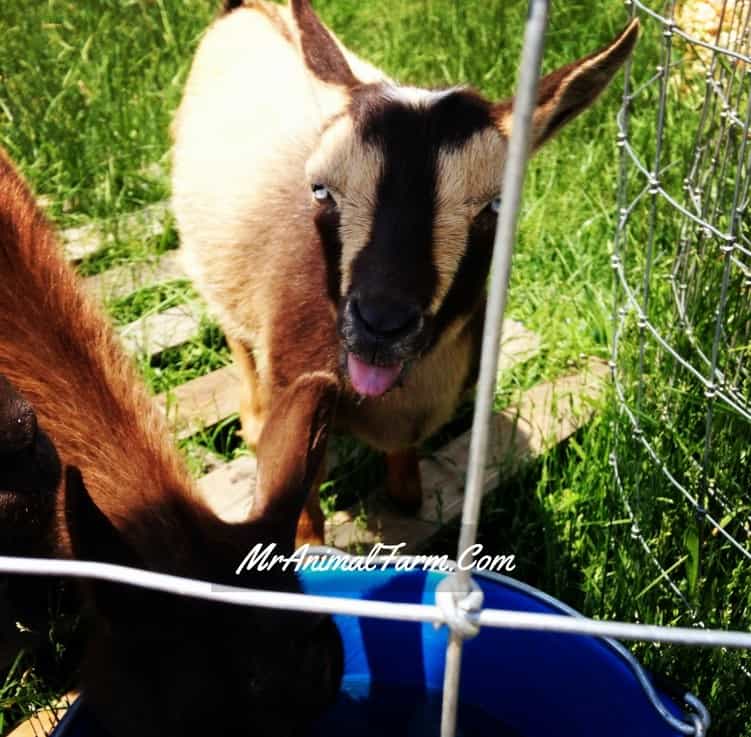
How much are baby goats?
These are for adults as well as the baby goat price. Pricing is based on genetics so there will likely be no difference between the two.
The only time there will be significant price differences is when an adult has been proven or when selling a bred doe or doe in milk. Those factors will increase the price of the adult goat.
Registered vs Unregistered
Registration is one of the biggest influences over the price, no matter the goat breed.
Some people don't care about having registered goats. Some are completely comfortable buying a goat off of Craigslist or at auction.
These are almost always going to be unregistered goats. Goats without registration papers are definitely cheaper but also carry a lot more uncertainties. The only information you have is what the goat owners can tell you (and you have to take them at their word)
Goats with registration papers often have a record of their family history. This history let's goat owners track desirable traits and make accurate predictions about future generations. If you will be breeding goats, having them registered makes it much easier to plan breedings because of this.
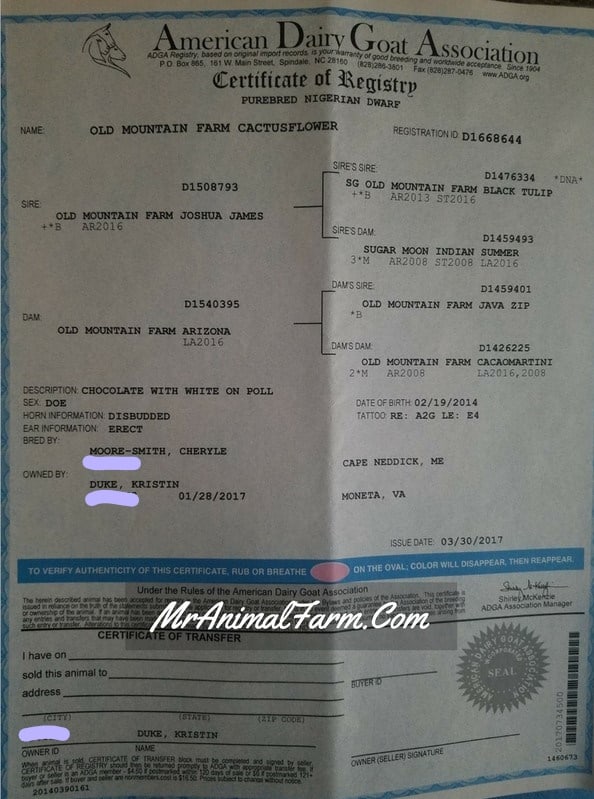
For example, if you want good milking dairy goats, you will likely want goats with family histories of high milk production. Registered goats are able to go through milk testing and gain milk stars (Not sure what a milk star is? Here's a whole list of goat terms for you).
If a goat is not registered, it is much more difficult to determine if a new baby goat is going to produce the volume of milk you will need.
Registration also creates a personal history for that specific goat. Any honors it has received is added to its record. So, if a goat has placed well in shows or has a proven record of top notch kids, registration will reflect all of this information.
Personally, from a health perspective, we are more comfortable buying from goat owners that have gone through the registration process. We feel that when goat owners go through the inconvenience of having their herd registered, it is more likely (but not always the case) that they also practice good herd disease management.
Because of all of the above mentioned reasons, purebred, registered goats are almost always going to cost more. You can use the registration information to help make a breeding goats plan.
Bucks Vs Does Vs Wethers
Another factor in price is the gender of the goat. As a general rule, wethers are the cheapest option, does are the priciest, with bucks falling somewhere in the middle.
If you want pet goats or a companion animal for another goat, you will likely want a wether. Wethers are neutered male goats that have been castrated. Since wethers have no functional purpose (as breeding or dairy goats) they are usually pretty cheap. In fact, sometimes a breeder will offer a discount or even send a wether along with a purchased doe for free.
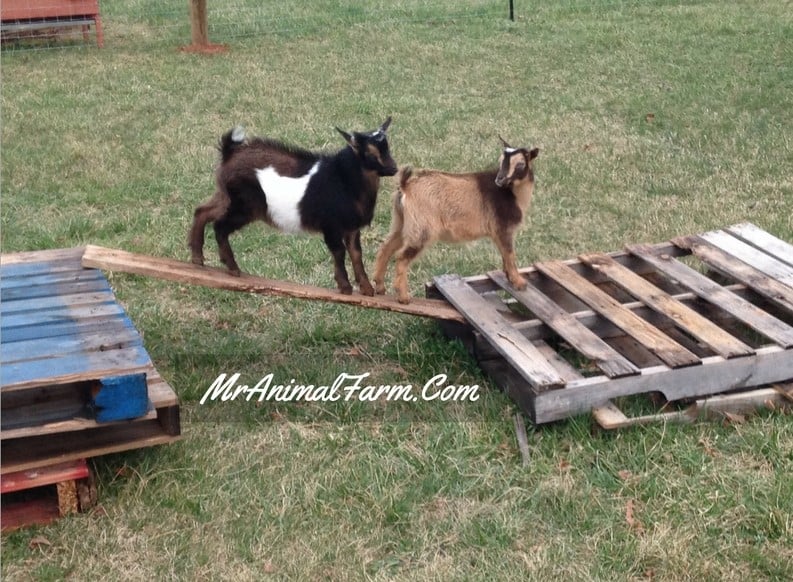
Bucks range in price depending on their pedigree. A proven buck can go for thousands of dollars but the laws of supply and demand can really make the price vary. Since most people only need a buck or two for a herd of dozens of girls it can sometimes be difficult to sell a good buck and thus will drive the price down.
Does are almost always the most expensive, especially if they are registered. Does are the goats that will give you milk and more cute baby goats. Because they have so much opportunity for added value to your herd, they are the most expensive.
Location
Your location will also influence how much a goat costs. Some areas have a ton of goat farmers while others are spread out. This is another case of supply and demand. If you live in an area with a lot of herd options, you will likely pay less than in an area with a single super star filled herd.
If you need more help keeping your goats healthy and well taken care of, check out the G.O.A.T. Herd Management System - worksheets, calculators, supply management and more to keep your goats in tip top shape while cutting down on time.
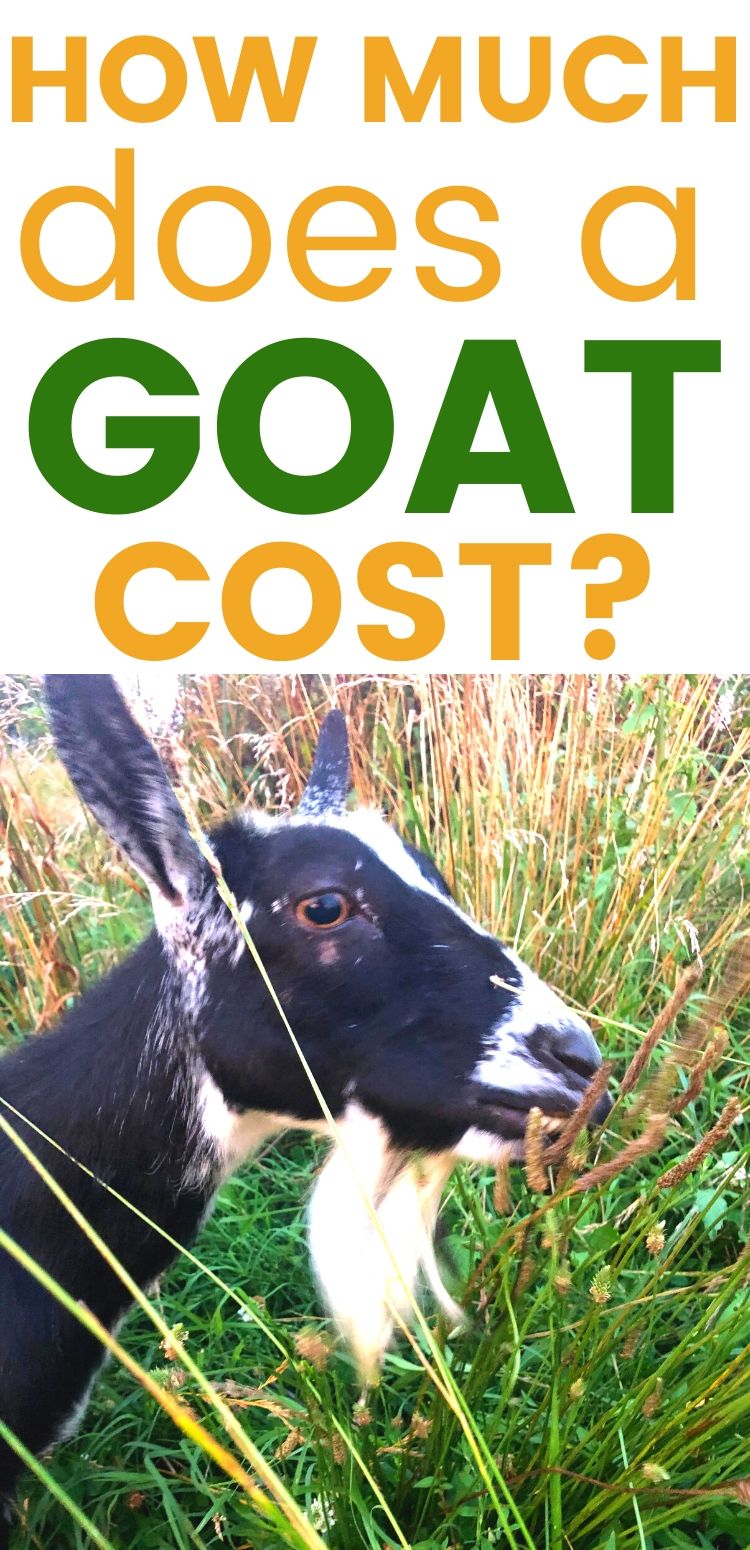
For more about goats...
[pt_view id="89114c7qgm"]

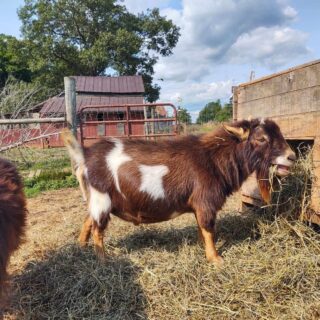
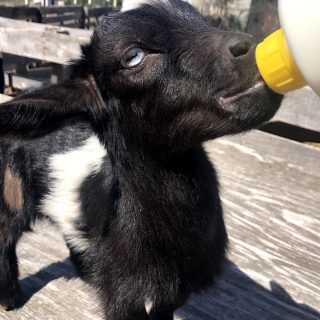
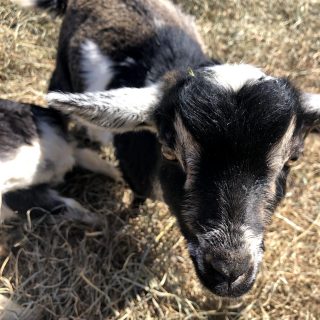
Kathy Acker says
Thanks for the information ! I'm looking for an old friend for my old goat in the Philadelphia area of PA. Heated shed, good food & love.
Cal Torgerson says
Price info is valuable.
I am planning and looking around soth Manitoba for goats
I have land.